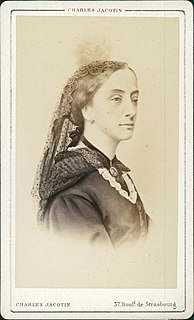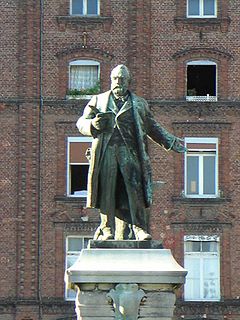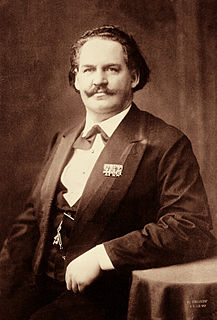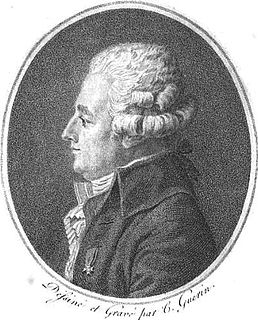
"La Marseillaise" is the national anthem of France. The song was written in 1792 by Claude Joseph Rouget de Lisle in Strasbourg after the declaration of war by France against Austria, and was originally titled "Chant de guerre pour l'Armée du Rhin".

Ary Scheffer was a Dutch-French Romantic painter. He was known mostly for his works based on literature, with paintings based on the works of Dante, Goethe, and Lord Byron, as well as religious subjects. He was also a prolific painter of portraits of famous and influential people in his lifetime. Politically, Scheffer had strong ties to King Louis Philippe I, having been employed as a teacher of the latter's children, which allowed him to live a life of luxury for many years until the French Revolution of 1848.

The Manufacture nationale de Sèvres is one of the principal European porcelain factories. It is located in Sèvres, Hauts-de-Seine, France. It is the continuation of Vincennes porcelain, founded in 1740, which moved to Sèvres in 1756. It has been owned by the French crown or government since 1759, and has always maintained the highest standards of quality. Almost immediately, it replaced Meissen porcelain as the standard-setter among European porcelain factories, retaining this position until at least the 19th century.

Dona Francisca was a princess of the Empire of Brazil, who became Princess of Joinville upon marrying François d’Orléans, son of the French king Louis Philippe I. The couple had three children. Through their oldest daughter, Francisca and François are the ancestors of Jean, Count of Paris, the present Orléanist pretender to the French throne.

C. Bechstein Pianoforte AG is a German manufacturer of pianos, established in 1853 by Carl Bechstein.

Jean-Baptiste André Godin was a French industrialist, writer and political theorist, and social innovator. A manufacturer of cast-iron stoves and influenced by Charles Fourier, he developed and built an industrial and residential community within Guise called the Familistère de Guise. He ultimately converted it to cooperative ownership and management by workers.

Friedrich Wilhelm Carl Bechstein was the maker of C. Bechstein pianos and the founder of C. Bechstein Pianofortefabrik.

Étienne-Jules Ramey, called Ramey fils, was a French sculptor.

Bazin Family / Bazin Dynasty.

The Musée de la Vie romantique stands at the foot of Montmartre hill in the 9th arrondissement of Paris, 16 rue Chaptal, Paris, France in an 1830 hôtel particulier facing two twin-studios, a greenhouse, a small garden, and a paved courtyard. The museum is open daily except Monday. Permanent collections are free. An admission fee is charged for temporary exhibitions. The nearest métro stations are Pigalle, Blanche, Saint-Georges, and Liège.
Jean-Louis Comolli is a French writer, editor, and film director. He was editor in chief of Cahiers du cinéma from 1966 to 1978, during which period he wrote the influential essays "Machines of the Visible" (1971) and "Technique and Ideology: Camera, Perspective, Depth of Field" (1971-2), both of which have been translated in English anthologies of film and media studies. This work was important in the discussion on apparatus theory, an attempt to rethink cinema as a site for the production and maintenance of dominant state ideology in the wake of May 1968.

The history of the de Dietrich family has been linked to that of France and of Europe for over three centuries. To this day, the company that bears the family name continues to play a major role in the economic life of Alsace. De Dietrich is a holding company based in France which traces its history back to 1684. The incumbent chairman of the supervisory board Marc-Antoine de Dietrich represents the 11th consecutive generation at the helm of the company. De Dietrich has been active in the automobile, railway and industrial equipment industry amongst others.

The Musée de la Faïence de Marseille was a museum in southern Marseille, France, dedicated to faience, a type of pottery. It opened to the public in June 1995 in Château Pastré at 157, Avenue de Montredon 13008 Marseille. It closed on 31 December 2012 to allow for the transfer of its collections to the new faience museum at Château Borély, the Museum of the Decorative Arts, Fashion and Ceramics, as part of preparations for Marseille becoming the European Capital of Culture in 2013.

Dominique-François-Xavier Boisselot was a French composer and musical-instrument manufacturer. He is the author of the opéra-comique in three acts Ne touchez pas à la reine to a libretto by Eugène Scribe and Gustave Vaëz. Boisselot left many art songs, including Villanella, whose text was written for Boisselot by Théophile Gautier in 1837.
Jean-Baptiste-Louis Boisselot was the founder of the piano company Boisselot & Fils. Coming from a family of violin makers based in Montpellier around 1770, he started his business by selling scores and musical instruments, especially from 1809 on when he focused on the sale of pianos and harps abroad.
Louis-Constantin Boisselot was a French piano manufacturer and the great artisan of the creation of the house of Boisselot in Marseille.
Boisselot is a French surname and may refer to:

Baron Philippe Friedrich Dietrich was a French scholar and politician. He was most well known as the first mayor of Strasbourg who encouraged Rouget de l'Isle to write various patriotic songs, including the song which became known as La Marseillaise, first performed in his living room; he was also known as a scientist, author of a mine survey and the development blast furnaces in France, distinguished geologist and chemist, and member of the Academy of Sciences. As mayor of Strasbourg, he accelerated revolutionary reforms throughout the region.

Pierre Bardou-Job was a French industrialist, manufacturer of JOB cigarette papers, and art collector.

The Société Boigues & Cie was a French ironmaking company based in Fourchambault, Nièvre, founded by a Parisian metal trader. Boigues et fils built a foundry at Fourchambault, Nièvre in 1821–22, the first in France to use the modern English technique of making iron using coal (coke) rather than charcoal. The company became a limited partnership, Société Boigues & Cie, in 1839 after the death of the co-founder Jean Louis Boigues. In 1853 it merged with other companies to form what would be later named the Société de Commentry, Fourchambault et Decazeville
















